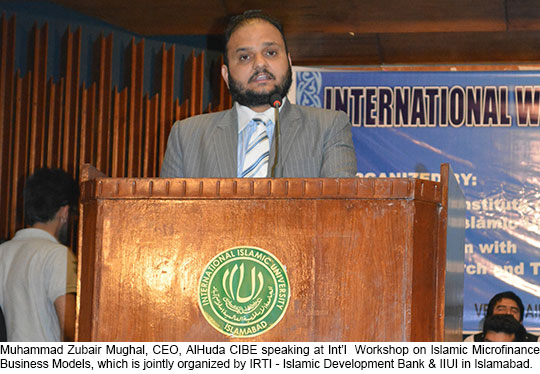يَـٰٓأَيُّهَا ٱلنَّاسُ كُلُوا۟ مِمَّا فِى ٱلْأَرْضِ حَلَـٰلًۭا طَيِّبًۭا وَلَا تَتَّبِعُوا۟ خُطُوَٰتِ ٱلشَّيْطَـٰنِ ۚ إِنَّهُۥ لَكُمْ عَدُوٌّۭ مُّبِينٌ - Surah Al-Baqarah [2:168]




| Pakistan and Sudan Leading in Islamic Microfinance Industry |
| Active Client Base of Islamic Microfinance have exceeded 2 Million: Zubair Mughal |
| 12th May,14 |
 |
| (Islamabad) The demand of Islamic microfinance is rapidly increasing in order to serve poverty alleviation and social development, Its active client size have exceeded to 2 million now from which more than 700,000 belong to Sudan and more than 400,000 clients of Islamic Microfinance Institutions are from Pakistan. On the other hand, Yemen, Indonesia, and Bangladesh also have a good number of clientage and Islamic Microfinance has satisfactory demand in Morocco, Senegal, Nigeria, and Tunisia. This was stated by Mr. Muhammad Zubair Mughal, Chief Executive Officer, AlHuda Center of Islamic Banking and Economic (CIBE) in addressing to International Conference on Islamic Microfinance Business Model that was jointly organized by IRTI – Islamic Development Bank and International Islamic university Islamabad. He further added that Islamic microfinance has been successfully utilized for poverty alleviation. Both Muslim and non Muslim are taking equal befit from this role model.
He said that in a few countries including e.g Nigeria, India, Tanzania, and Ethiopia, Islamic microfinance is being utilized as only for Muslims communities but this is quite wrong, Islamic microfinance should be used as a business model not as religious intervention, Islamic Microfinance is a system which can be utilized and operated by all the segment of society without any religious discrimination. Yes, there is an extra benefit for Muslims that it is in accordance with their religious belief but for non-Muslim it is an ideal financial instrument for poverty alleviation and social uplifting. He added that there are lots of challenges faced by Islamic microfinance i.e. squeezed volume of organizations, lack of technical expertise and quality HR, lack of standardization of the products etc but the main hurdle is lack of funds for Islamic microfinance institutions, this is why the growth is not so constant of this influential system but It can be rectified with venture capital, Social Sukuk, Centralized Zakat System, revitalization of Waqf concept, Islamic banking charity to be used in Islamic microfinance, Crowed funding platform and create liaison between Islamic banking and Islamic microfinance Institutions. He said it is quite wrong thinking that Islamic microfinance is a complicated financial product; actually It can easily be implemented in any country in any type of Islamic Microfinance Institutions. All Islamic microfinance products whether that is Grameen Model, Village Banking Model, Credit union model, Cooperative Model or self help group etc are all in line with models of microfinance credit. He further added that before using Islamic microfinance in Conventional microfinance system, minor changes are to be done in the system i.e. use of Islamic microfinance products instead of interest based products, Islamic insurance (Takaful) instead of Conventional insurance, and the Shariah method of savings and investment etc. |
Strategic Partners